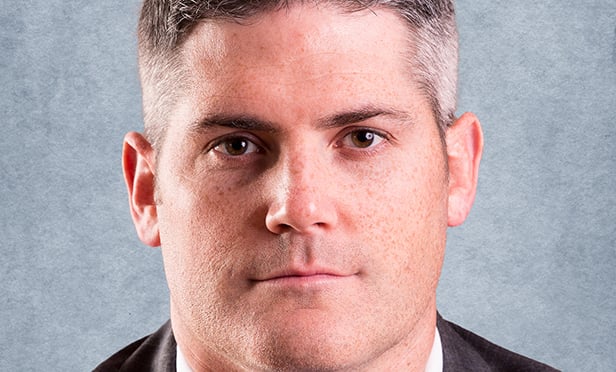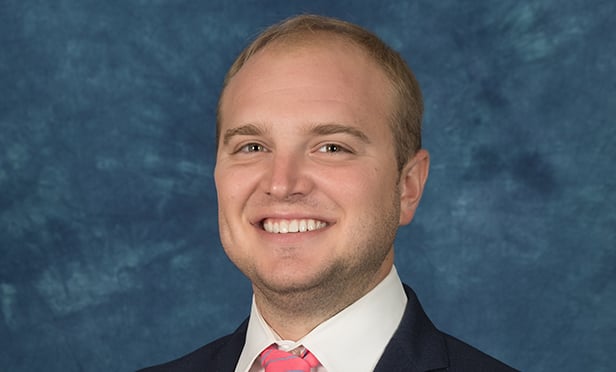LAS VEGAS—While all eyes attempt to gauge where the future of retail is heading—and who will be left standing once the re-shuffling brought about by technology is finished—one major vehicle for investment is firing on all cylinders: net lease. But that's not to say it's without its own concerns. GlobeSt.com met up with Patrick Luther, managing director at Faris Lee Investments, to get his take on the sector's health, the value of a skilled broker and how the interest for net lease is changing.
GlobeSt.com: What is happening in net lease space today?
Patrick Luther: Transaction velocity continues to grow year-over-year within the triple-net sector. Demand is due to 1031 exchange requirements from sellers of other asset classes, primarily vacant land and multifamily, lowering cap rates and providing high valuations for net leased property. But, I believe that the market has been softening slightly over the past quarter, particularly across commoditized tenant classes like drug and dollar stores.
GlobeSt.com: Why drug and dollar stores?
Luther: Drugstore owners are “opportunistically” listing their assets for sale as they see peak pricing and record-breaking cap rates. Within the dollar store space, pricing is affected negatively by the sheer number of stores under construction among all brands including Family Dollar, Dollar General, Dollar Tree, and Fred's. So, while cap rates are at historic lows for some assets, I see a cap rate floor and pricing peak particularly for sectors within the net lease space that are overbuilt, or where there is an abundance available for sale.
GlobeSt.com: How long will this peak pricing remain?
Luther: I think we will begin to see a shift in supply and more available inventory throughout the next year. Both institutional and private investors realize that pricing is strong and they don't want to miss the boat on maximizing their returns. With compressing cap rates on net leased product with credit tenants, we see increasing demand – even from institutional investors – for sub-investment grade retailers, those in tertiary markets, or assets with issues including declining store sales.
GlobeSt.com: With the market being favorable, how do you advise your sellers?
Luther: No matter where were are in the cycle – skilled brokerage is crucial to differentiate each asset for a seller, otherwise the property becomes commoditized and the sales process is simply a race to find the desperate seller. It isn't as simple as posting a listing up on a website hoping to find a buyer. It is a much more tailored effort.
For example, over 100 pharmacies are on the market across the country right now. Even with comparable remaining lease terms, these properties will vary by up to 75 basis points in cap rate due to location, branding, who the property is marketed to, and how the asset is positioned. Faris Lee recently completed the sales of two CVS Pharmacy-occupied properties at record-low 4.8 percent cap rates by identifying event-driven 1031 exchange buyers, one of which was a foreign national. This buyer type places a higher value on these assets than others, but the key is in identifying the potential buyer profile in a timely way. We also have to ensure the transaction goes smoothly to close within the required time frame. The success with these CVS sales – as well as other properties that Faris Lee markets in all retail property categories – is driven by the strategic way a property is positioned, branded and defined to the marketplace on an individual basis.
GlobeSt.com: What types of sellers are you working with now?
Luther: Our primary seller profile is the merchant developer building to a specific and usually tight cap rate on cost, making that seller highly sensitive to maximizing proceeds and achieving a strong exit sale cap rate.
We also work with institutional investors who are looking to sell off non-core and non-performing assets. For example, we are executing the sale of a non-core, $25 million restaurant portfolio for a public REIT consisting of nine sites including Jack in the Box and Texas Roadhouse and others with remaining lease terms of 10 years and a 5.75 blended average cap rate. We are selling these assets off individually to separate private investors. We are also assisting a hedge fund in a very complex sale of a 42-property portfolio of leasehold interest/sandwich position net-lease assets.
GlobeSt.com: How do you find buyers?
Luther: Access to a deep and unique buyer pool and personal relationship building is key. As a Southern California-based firm, we work with a large amount of Southern California-based high net worth individuals and family offices. The amount of California capital seeking property is astounding. Buyers are investing in both value-add and stabilized plays, and the majority of them are looking for out-of-state opportunities in growing markets. Markets we comb for similar buyer profiles also include New York, Florida and Texas. Uniquely, Faris Lee, in conjunction with bilingual team members, is focused on co-brokering with foreign brokers and their investors—primarily from Asia and South America.
Visit Faris Lee Investments at ICSC RECON in Las Vegas at Booth C150M.
© 2025 ALM Global, LLC, All Rights Reserved. Request academic re-use from www.copyright.com. All other uses, submit a request to [email protected]. For more information visit Asset & Logo Licensing.







